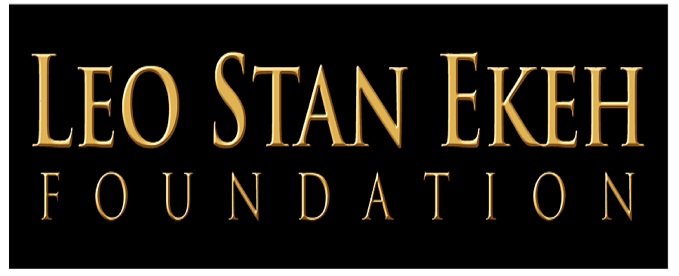This is contained in a statement signed by Dr Ejike Ndiulo, head of Corporate Communications, Air Peace, on Wednesday in Lagos.
According to Ndiulo, the decision is necessary because NiMet is the agency responsible for issuing CNH (Current Nowcast of Hazardous Weather) reports, critical for safe landings, especially during this season of heavy rainfall and thunderstorms.
He said without these reports from the control tower, flight safety could not be guaranteed.
“As a safety-first airline, we have chosen to act responsibly by suspending operations until NiMet resumes full service.
“We understand this may cause inconvenience, and we sincerely apologise. Passengers will be contacted with updates and options for rescheduling,” he said.
The staff of NiMET on Tuesday commenced an indefinite strike over the condition of service and other demands.
News
Leo Stan Foundation Taps Emelonye as DG, to Manage N1.5Bn Revolving Loan Project

Leo Stan Ekeh, chairman, Leo Stan Ekeh Foundation (LSF), has appointed Engr. Amasike Emelonye as director general (DG) to head a team set up to manage the N1.5bn revolving loan scheme for entrepreneurs and indigent students in Imo State.
Ekeh had announced a three-year revolving interest free loan of N1b over the next 10 years to petty traders and small and medium businesses in Imo State on August 28, 2019. T
 Leo Stan Ekeh
Leo Stan Ekeh
he intervention, he revealed, is to reduce hardship, stimulate business activities and give hope to majority of the people in the state.
Further, Ekeh launched an educational support project for indigent but intelligent students of the state to enable them acquire proper university education.
For this, Ekeh set up a non-interest revolving loan scheme of N500m which shall stretch over the next 10 years to help others benefit from the scheme.
Emelonye, a first class British trained technology guru was the pioneer managing director of Zinox Technologies, one of the companies founded by Ekeh. Educated in the United Kingdom with multiple degrees and professional certifications, Emelonye is a thoroughbred ICT professional.
He led the Zinox team that designed the INEC electronic voter register system and co-developed the INEC SmartCard Reader and PVC system, amongst several other notable national and state projects.
A renewable energy and biometric solutions consultant to several Agencies, Emelonye is a tech guru who has led major ICT infrastructural developments.
 Engr. Amasike Emelonye
Engr. Amasike Emelonye
He hails from Ideato South Local Government of Imo State and is happily married with a lovely wife and two brilliant children.
Ekeh disclosed that Emelonye was appointed based on his solid pedigree.
Furthermore, he affirmed that the platform for the N1.5bn loan scheme will be digitally-driven and with less human interface to avoid manipulations and compromises.
As a result, Emelonye’s industry experience will come in handy. In addition, he informed that other members of the management team will be unveiled soon.
Ekeh, who was reluctant to go further, when asked, disclosed that he is a product of a trust economy.
He added that he has done business in the last 37 years based on trust and not by pledging his assets based on collateral.
“The biggest collateral you can have today is your integrity. You cannot build a multinational company based on pledging your assets. So, I am giving a chance to others in this regard, even though it is a huge risk. If this works, it will help a lot of needy entrepreneurs and indigent children acquire quality education and challenge the status quo or what I call wealth disruption in the 3rd world.
“This is not a political-oriented programme and, as such, politicians are barred from participation. It is also not a showbiz. Therefore, I urge the media to see themselves as partners in progress and only focus on sharing relevant information pertaining to the scheme.”
On the likely commencement of the scheme, Ekeh revealed that the project will take off before September ending.
“The first set of beneficiaries, about 1400, will take off before the end of September while we build remote technology to on-board the next batch. At the moment, our tech guys are working on the back-end. We want to limit human interference by at least 90% and instead, drive the project through technology,” he said.
Ekeh, who was met on arrival from a closing ceremony of a summer re-training exercise for teachers in his local government, Ubomiri in Mbaitoli Local Government which he funds every year, was quizzed as to whether the beneficiaries of the loan scheme will be able to repay the investment.
“Well, with human beings, you have to take a risk. The human capital in Imo State is very strong. I have no doubts about that. However, the infrastructural readiness of the state is a bigger problem. From what I have seen, Imo State is in a pitiable state and only God can save the state from its current level of infrastructural decay.
“The young Governor I can see is almost desperate to change the Imo story. You visit Imo and leave very depressed. It is really unfortunate.”
The serial digital entrepreneur who decried the sorry state of infrastructure in the State, further called on other well-meaning Imo indigenes to rise to the challenge.
“I plead with other indigenes of the state to contribute no matter how small to enhance the profile of their respective kindred. It will count,” he concluded.
News
EFCC Secures Arrest Warrant for Six CBEX Promoters

A federal high court in Abuja has granted permission to the Economic and Financial Crimes Commission (EFCC) to arrest and detain six Crypto Bridge Exchange (CBEX) promoters over allegations of investment fraud to the tune of over one billion dollars.

Emeka Nwite, presiding judge, gave the order following an ex parte application moved by Fadila Yusuf, counsel to the EFCC.
In the application by the EFCC, the six suspects are Adefowora Olanipekun, Adefowora Oluwanisola, Emmanuel Uko, Seyi Oloyede, Avwerosuo Otorudo and Chukwuebuka Ehirim.
The commission sought an order of the court for a warrant of arrest of the defendants.
They also prayed the court for “an order remanding the defendants in the custody of the complainant/applicant pending the conclusion of investigation of the alleged offences and possible prosecution”.
Yusuf said that the defendants are at large and a warrant of arrest is required to arrest the defendants for proper investigation and prosecution of this case.
In the affidavit in support of the motion, the EFCC said preliminary investigation into the intel revealed that the defendants “using their company ST Technologies International Limited, promoted another company Crypto Bridge Exchange (CBEX) by making adverts and lured unsuspecting members of the public to invest crypto cryptocurrencies on the CBEX investment platform”.
The EFCC said the defendants promised an unrealistic return on investment of up to 100 percent.
“The victims were made to convert their digital assets into a stablecoin of USDT for onward deposit into the suspects’ crypto wallet,” Yusuf said.
“The victims were initially given full access to the platform to monitor their investment.
“Following the deposits valued at over $1 billion by the victims, the CBEX investment platform became inaccessible to them, and they could no longer withdraw from the investment made.
“The victims later discovered that the said scheme is a scam.
“During the course of investigation, it was discovered that the said ST Technologies International Limited, though registered with the Corporate Affairs Commission (CAC), it was not registered with the Securities and Exchange Commission (SEC) for investment purposes.
“It was also discovered during the investigation that the defendants had moved out of their last known address in Lagos and Ogun states.”
The anti-graft agency said obtaining a warrant of arrest was necessary in order to place the defendants on a watch list, enabling authorities to trace and apprehend the suspects to face the charges brought against them.
Nwite granted the request for a warrant of arrest and remand, adding that the order was necessary to enable the commission to apprehend the defendants and conclude its investigation.
“I have listened to the submission of the learned counsel for the applicant,” Nwite said.
“I have also gone through the affidavit evidence with exhibits thereto, along with the written address.
“I am of the view and I so hold that the application is meritorious.
“Consequently, the application is granted as prayed.”
Earlier in April, reports emerged that CBEX users could no longer withdraw their funds.
On Monday, angry investors stormed and looted the office of Smart Treasure (ST Team), an affiliate of CBEX, in Ibadan, Oyo State.
The EFCC recently confirmed receiving multiple complaints about the platform.
Dele Oyewale, the commission spokesperson, assured affected investors that efforts were underway to recover their funds.
News
Air Peace Suspends Flight Operations Nationwide

News
NITDA Fixes Date for Inaugural Meeting of the Startup Consultative Forum

The National Information Technology Development Agency (NITDA) is pleased to announce the inaugural meeting of the Startup Consultative Forum, scheduled for Monday April 28, 2025 This milestone event marks a significant step in deepening stakeholder engagement within Nigeria’s growing startup ecosystem.

The Forum will serve as an interactive platform for startup founders, innovators, ecosystem enablers, and intermediaries to actively shape national policies that foster growth, attract investment, and drive digital innovation.
Convened under the framework of the Nigeria Startup Act (NSA), this initiative reflects the government’s commitment to making startups not just stakeholders but key contributors in building an enabling environment for innovation.
The meeting will emphasize collaborative dialogue, with a primary focus on nominating and selecting representatives for the National Council for Digital Innovation and Entrepreneurship (Startup Council)—Nigeria’s highest advisory body for the startup ecosystem. Decisions from this Forum will lay the foundation for inclusive policy development, amplifying the voices of Nigeria’s tech and innovation community.
NITDA invites all Labelled Startups, Verified Entrepreneurial and Innovation Support Organisations, Angel Investors, Venture Capitalists, and other relevant stakeholders to join the Forum and actively participate in the nomination and voting process.
Join us in shaping the future of digital innovation in Nigeria. Together, we can build a thriving ecosystem that supports and celebrates the pioneering spirit of Nigerian startups.

 Telecom3 days ago
Telecom3 days agoNigeria Hits 1 Terabit Internet Traffic Milestone

 E-Financial3 days ago
E-Financial3 days agoFCMB Capital Markets Leads ₦11.85bn GLNG Bond for LNG Plant Expansion

 General News3 days ago
General News3 days agoFG to Introduce New Tax Credit Scheme to Replace Pioneer Status Incentive

 Telecom3 days ago
Telecom3 days agoMTN Nigeria Faces Class Action Lawsuit over Alleged Data Mismanagement

 News3 days ago
News3 days agoIMF Downgrades Nigeria’s Economic Growth Forecast Amid Oil Price Decline

 News3 days ago
News3 days agoNITDA Fixes Date for Inaugural Meeting of the Startup Consultative Forum

 E-Financial2 days ago
E-Financial2 days agoUnion Bank’s Edu360 Initiative Scores Big for Nigerian Football Development

 Telecom3 days ago
Telecom3 days agoMart Networks Unveils Invinsense 6.0: AI-Powered Cybersecurity Revolution in Africa





























